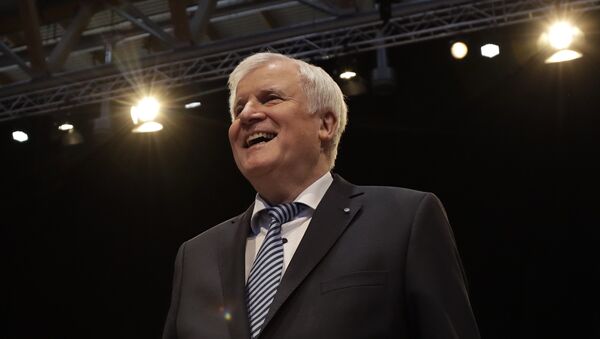German Interior Minister Horst Seehofer, representing the CSU, has called on European Union states to show more solidarity, given the rising number of refugees on the Greek islands, suggesting the continent could face a refugee flow "even greater" than the 2015 wave that resulted in a full-scale crisis.
"We need to do more to help our European partners to control the EU's external borders, and we have left them alone for too long. If we do not, we will see a wave of refugees like the one in 2015 - maybe even greater than four years ago," the minister, known for his hardline views on migration, told the German outlet Bild am Sonntag.
He pledged to do "everything to help" with incoming EU Commission President Ursula von der Leyen, representing Angela Merkel's CDU and revealed that he enjoys the "full support" of the chancellor. These statements have come ahead of the grand gathering of EU interior ministers, who are to meet to discuss migration policies on Tuesday.
Seehofer, who travelled to both Turkey and Greece, which remain the key gateways for refugees from war-torn and economically-challenged countries of the Middle East, also urged the block to provide more help to Ankara, in a separate interview with Welt am Sonntag. For three years, the EU has already agreed to allocate $6.59 billion for projects designed to help to deal with the refugee flow from Syria to Turkey, although Ankara has been accused of breaking its part of the deal.
"Turkey is doing a great deal in welcoming refugees. It is also in our interests, but it is clear that we cannot manage the future with the resources of the past," Seehofer told the outlet about Europe's partner in the Middle East.
A Quarter of Rescued Migrants Go to Germany from Mediterranean
Earlier, Seehofer pledged that Germany would take every fourth asylum seeker rescued following shipwrecks in the Mediterranean, used by smugglers for trafficking migrants from Africa. The idea faced criticism from Seehofer's party, the CDU-CSU union, and the leader of its parliamentary group, Ralph Brinkhaus, as well as from the Free Democratic Party.
CDU board member Mike Mohring voiced concern that there is a risk this interim measure would "become a permanent solution" in his interview with the Funke media group.
The German minister, however, received the support of EU Migration Commissioner Dimitris Avramopoulos, who insisted that disembarkation efforts should not be isolated.
"Our primary goal is to reduce irregular arrivals, fight smugglers and facilitate the return of irregular migrants - as well as to save lives and open up legal channels for those in need of protection," he said, as cited by Sueddeutsche Zeitung, also voicing his positive feelings about the upcoming minister's meeting on Tuesday.
But as political observer at Corriere Della Sera, Paolo Salom, has told Sputnik, Berlin will hardly open its borders as it did in 2015 as the political environment in Germany has changed dramatically. He suggests that Angela Merkel, who is in the final stage of her political career, would not be able to say: "We can do it".
As for Seehofer's grave prognosis about the coming greater wave of migration, Salom linked it to Turkey's alleged wish to press the EU for political and economic reasons, as the number of refugees it houses can now be released. However, what Europe can offer Turkey remains the main problem, according to the journalist.
"It's likely that Ankara has asked for more economic support, money to fulfil its obligations as per the 2015 agreement. Turkey is also looking for energy sources in the Mediterranean, in areas linked to other Countries' rights of exploitation," he said, noting that there are tensions between Turkey and several countries, including Cyprus, Italy, France and even the US.


